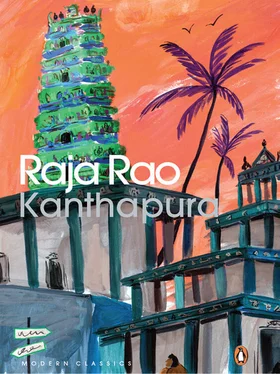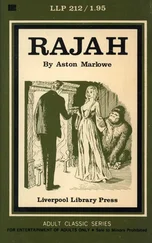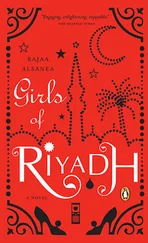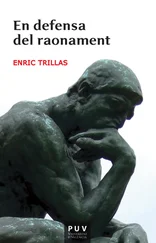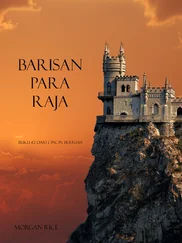And Siddanna’s neighbour shouts to Madanna, and Madanna’s neighbour shouts to Rachanna, ‘He, the dame is soft, hè, brother?’—’Oh yes, soft as a pumpkin’s kernel.’—’Hè, the river is rising, brother, do you see the brownish waters?’ And then there is a grunt and gurgle from over the Blue Mountains, and a fine, swishing rain pours down upon the earth. They stop the bulls, and seated beneath the tamarind trees, they light their bidies, and when the cows are milked, women take them their food. Today there will be sweetmeats and fresh rice. ‘Oh, you prostitute of a wind! She’s showing her tricks again. Stop, you bitch!’ There! The winds die over the river, and the rain pours on.
O Kenchamma, in a week we shall have ploughed and manured and sowed. Send us rain for three days, dry weather for two days, and rain again, a fine, soft rain, Kenchamma. And when Moorthappa comes, let the rice be fine as filigree and the mangoes yellow as gold, and we shall go out, horn and trumpet and gong before us, and break coconuts at his feet. O Moorthappa, Kenchamma will protect us all.
They say he’ll come, Moorthy, when the winds will have risen.
Then everybody said, ‘We shall do this for Moorthy’s coming and that for Moorthy’s coming,’ and Rangamma said she would offer a feast at the river, a moonlight feast, and Nanjamma said she would offer a syrup-and-banana libation at the temple, and some said they would spin more and more, and Pariah Lingayya said he would offer Moorthy a red khadi shawl, and Seenu said, ‘Why, I shall make the boys sing “Oh, such were our men of 1857”’. But Vasudev said Badè Khan was looking strange lately, and that something must be in his head, but Rangamma said, ‘Well, so be it, what does it matter? We are so many now,’ and everybody said, ‘Well, it will be fine when Moorthy comes.’ And Chinnamma’s mother-in-law was so happy that she said, ‘The rice-eating ceremony of the child, well, it will be when Moorthy is our guest.’ Pariah Rachanna says, ‘Why not build a pandal at the entrance of the village, like we do when the collector comes?’ And they go to see Rangamma. ‘Mother Rangamma, when is he coming, our Moorthappa?’ and Rangamma says, ‘I do not know, it must be on Saturday or Tuesday,’ and Lingayya says, ‘Then you’ll tell us poor folk, Mother, and we shall make it bright, and have a pandal and have the camphor lighted to the village-gate goddess,’ and Rangamma feels so happy that she says, ‘Why, it will be grand.’
And that afternoon, Postman Subbayya, who had no fire in his stomach and was red with red and blue with blue, comes running with the blue paper in his hand and says, ‘Rangamma, Rangamma, your Moorthy is released,’ and we all say, ‘Show us that, show us!’ and Rangamma snatches the paper and reads out that Moorthy has been released from prison, and that he has said this and that, and Sankar had organized a huge meeting to receive him, and we all said, ‘So he’s coming now, he’s coming,’ and we left our vermicelli paste and cotton wicks and we sang, ‘The Blue god he comes, prancing and playing,’ and the Pariahs went to the mango grove and tore down young leaves and twigs, and Patel Rangè Gowda said, ‘Take two banana trunks from my garden,’ and they slew two banana trunks, and when evening came there swung over the Karwar road a yellow arch of banana leaves and a green festoon of mango leaves, and the two candelabras stood like Brahma’s guardians of the twin portals, and everybody said, ‘It will be so fine on Tuesday, it will be like the swing festival of the goddess.’
But when Venkamma hears of this she says, ‘Oh, you polluted ones, this is what you are going to do! Well, well!’ and she rushes straight to Rangappa to consult him about her daughter’s nuptial date, for young Nanja had come of age a few days before, and she says, ‘Can it be this Tuesday, Rangappa?’ and Rangappa finishes his evening prayers, and takes a pinch of snuff and, opening the calendar, he says, ‘Why, it could be; but they say that fellow Moorthy is coming,’ and she says, ‘It is just that, Rangappa — don’t you see?’ and she sends messengers to Alur to inform her gap-toothed son-in-law of the nuptial ceremony, and the next morning at the river she says, ‘I want my daughter to go to her husband’s house soon. Tuesday will be the nuptial day, and you are all welcome, sisters, and the invitation will be sent to you,’ and we all say, ‘But that’s the day Moorthy is coming,’ and she says, ‘Well, choose between a Brahminic feast and a feast for a polluted pig,’ and they say, ‘Why, of course, Moorthy was excommunicated; but how funny that we forgot all about it since he’s been in prison!’ and Venkamma cries out, ‘That’s it, sister. You forgot it. But this body that has borne eight children cannot forget it. If you had a daughter to marry, you would not forget it, would you?’ In the evening the invitation rice is sent — it is Priest Rangappa’s wife Lakshamma who brings it, and she says, ‘In Venkamma’s house there will be a nuptial ceremony on Tuesday. You are all invited,’ and they offer kumkum to her silently in return, and everybody asks, ‘And now what shall we do?’ and they speak of it to their husbands and their husbands speak to their aunts, and the aunts say, ‘Why, you cannot refuse a nuptial feast. If there’s no married woman to offer kumkum water to the wife and husband, well, tomorrow you may have your own daughter’s marriage, and she may go unblessed!’ and they all say, ‘Of course! Of course!’ And the next morning everyone is late at the river, and when Rangamma goes up the steps, they all whisper together, ‘Now we are safe. Now we are safe,’ but as they pass through the Pariahs’ quarter and the Weavers’ quarter and the Potters’ quarter, they see that a mango-leaf garland of welcome hangs at each door and the courtyards are swept and washed and decorated. And at the village gate carts are seen to come up, carts from Alur that bring Venkamma’s son-in-law, and his relations and his relations’ relations. And when they are at the mango grove, they see Badè Khan coming down the Bebbur mound, his dog and boots and cummerbund and all. And Nose-scratching Nanjamma turns to Satamma and whispers, ‘It seems Nanja gets a hundred-and-fifty rupee diamond nose ring.’—’Oh, probably it’s his first wife’s nose ring,’ says Satamma sadly.
The cornets are already piping the song of welcome on Venkamma’s veranda.
They said Moorthy would come by the blue bus that runs from Kallapuri to Karwar, and we all said, ‘That will be when the sun has passed over the courtyard,’ and we were at the village gate when the cattle had drunk the afternoon rice water and gone, and the Pariahs were already there, with blankets and coconuts and horns, and the weaver folk were there with silk upper-cloths, and the potters with pots and the betel-sellers with betel leaves, and even lazy Rangè Gowda was there, rubbing his eyes and waving his turban to keep away flies and perspiration — so sultry was the day. And Rangamma and Ratna were in the shade of the pipal platform, and Satamma’s daughter, Ranga, and Nanjamma’s daughter, Sata, were there too. ‘Oh, you need not come to Venkamma’s dinner, children. You are still young, you can go to meet Moorthy,’ they had said, and given them a cold meal and a glass of watered curds. And Ranga and Sata prepared the kumkum water, and they gave us all coloured rice, and we all said, ‘He’ll be here soon — he’s coming, he’s coming,’ and the stones beneath began to scorch us, and someone said, ‘Why, the bus must have met with an accident,’ and everyone said, ‘No, no, speak not of such ill omens,’ and the Pariahs scratched their legs and began adjusting the grapefruit here, the coconut there, and the mango leaves everywhere on the pandal, and people sat down and opened their betel bags and snuffboxes, and some said, ‘Come let us remove these stones,’ and they removed the pebbles from the path.
Читать дальше
